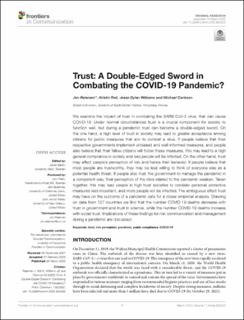| dc.contributor.author | Reiersen, Jon | |
| dc.contributor.author | Roll, Kristin Helen | |
| dc.contributor.author | Williams, Jesse Dylan | |
| dc.contributor.author | Carlsson, Michael | |
| dc.date.accessioned | 2022-05-27T07:56:50Z | |
| dc.date.available | 2022-05-27T07:56:50Z | |
| dc.date.created | 2022-05-04T18:45:14Z | |
| dc.date.issued | 2022 | |
| dc.identifier.citation | Reiersen, J., Roll, K., Williams, J. D. & Carlsson, M. (2022). Trust: A Double-Edged Sword in Combating the COVID-19 Pandemic? Frontiers in Communication, 7, Artikkel 822302. | en_US |
| dc.identifier.issn | 2297-900X | |
| dc.identifier.uri | https://hdl.handle.net/11250/2996345 | |
| dc.description.abstract | We examine the impact of trust in combating the SARS-CoV-2 virus, that can cause COVID-19. Under normal circumstances trust is a crucial component for society to function well, but during a pandemic trust can become a double-edged sword. On the one hand, a high level of trust in society may lead to greater acceptance among citizens for public measures that aim to combat a virus. If people believe that their respective governments implement unbiased and well-informed measures, and people also believe that their fellow citizens will follow these measures, this may lead to a high general compliance in society and less people will be infected. On the other hand, trust may affect people’s perception of risk and hence their behavior. If people believe that most people are trustworthy, they may be less willing to think of everyone else as a potential health threat. If people also trust the government to manage the pandemic in a competent way, their perception of the risks related to the pandemic weaken. Taken together, this may lead people in high trust societies to consider personal protective measures less important, and more people will be infected. The ambiguous effect trust may have on the outcome of a pandemic calls for a closer empirical analysis. Drawing on data from 127 countries we find that the number COVID-19 deaths decrease with trust in government and trust in science, while the number COVID-19 deaths increase with social trust. Implications of these findings for risk communication and management during a pandemic are discussed. | en_US |
| dc.language.iso | eng | en_US |
| dc.rights | Navngivelse 4.0 Internasjonal | * |
| dc.rights.uri | http://creativecommons.org/licenses/by/4.0/deed.no | * |
| dc.title | Trust: A double-edged sword in combating the COVID-19 pandemic? | en_US |
| dc.type | Peer reviewed | en_US |
| dc.type | Journal article | en_US |
| dc.description.version | publishedVersion | en_US |
| dc.rights.holder | © 2022 Reiersen, Roll, Williams and Carlsson. | en_US |
| dc.source.volume | 7 | en_US |
| dc.source.journal | Frontiers in Communication | en_US |
| dc.identifier.doi | https://doi.org/10.3389/fcomm.2022.822302 | |
| dc.identifier.cristin | 2021563 | |
| dc.source.articlenumber | 822302 | en_US |
| cristin.ispublished | true | |
| cristin.fulltext | original | |
| cristin.qualitycode | 1 | |

